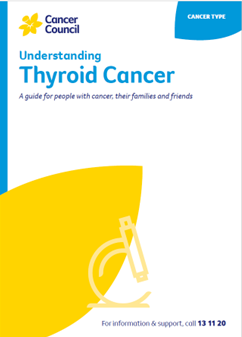- Home
- Thyroid cancer
- Treatment
- Thyroid hormone replacement therapy
Thyroid hormone replacement therapy
When the whole thyroid is removed, your body doesn’t make certain hormones, so you’ll need a hormone tablet to replace T4 (thyroxine).
After a partial thyroidectomy, the remaining lobe usually makes hormones, so most people won’t need thyroid hormone replacement therapy.
Learn more about:
Taking thyroid hormone tablets
You usually start taking T4 straight after surgery, and while still in hospital. You will need to take it every day for the rest of your life.
Taking thyroid hormones has two roles:
Keeping your body’s metabolism functioning at a normal healthy rate – Without hormone replacement tablets, your metabolism will slow down and you will develop the symptoms of hypothyroidism.
Reducing the risk of the cancer coming back – T4 medicine stops your pituitary gland from releasing too much thyroid-stimulating hormone (TSH). High levels of TSH can encourage the growth of any thyroid cancer cells left after treatment. If your doctor thinks there’s a medium or high risk of cancer returning, you may have a high dose of T4 to reduce your TSH level – called TSH suppression.
Finding the right dose
When you start thyroid hormone replacement therapy, you’ll be monitored and have blood tests every 6–8 weeks to help get the right dosage for you. Usually, the initial dose needs only minor adjustments.
A small number of people may experience hypothyroidism or hyperthyroidism during the adjustment period. Side effects can include anxiety, problems sleeping, racing heart and sweating. However, once you are taking the right dose, you shouldn’t have any side effects.
Tips for taking T4 medicines
- Get into a routine of taking your T4 medicine at the same time every day. Take it on an empty stomach with a glass of water and wait 30 minutes before eating. Most people find it easiest to take before breakfast.
- You may need to store medicines in the fridge to maintain the T4 level in the tablets. If you are travelling, the medicine will last up to 30 days out of the fridge. Some T4 medicines do not need refrigeration – check with your doctor or pharmacist.
- Wait 2 hours before taking calcium or iron supplements as these affect the stomach’s ability to absorb the T4.
- If you miss a dose, you should usually take it as soon as you But if it’s almost time to take the next dose, skip the dose you missed.
- Check with your doctor if it’s safe to continue taking other medicines or supplements.
- Tell your doctor if you are pregnant or planning to get pregnant, as you may need to take a higher dose.
- Do not stop taking your T4 medicine without talking about it with your doctor first.
→ READ MORE: Radioactive iodine treatment
Podcast: Making Treatment Decisions
Listen to more of our podcast for people affected by cancer
More resources
A/Prof Diana Learoyd, Endocrinologist, GenesisCare North Shore, Faculty of Medicine and Health, University of Sydney, NSW; Emeritus Professor Leigh Delbridge AM, The University of Sydney, Thyroid Surgeon, The Mater and North Shore Private Hospitals, NSW; Prof Ruta Gupta, Tissue Pathology and Diagnostic Oncology, Royal Prince Alfred Hospital and The University of Sydney, NSW; Susan Leonard, Cancer Nurse Coordinator Thyroid and Brachytherapy, Cancer Care Services, Royal Brisbane and Women’s Hospital, QLD; Dr Dean Lisewski, Endocrine and General Surgeon, Fiona Stanley Hospital and St John of God Hospital, Murdoch, WA; Caitriona Nienaber, 13 11 20 Consultant, Cancer Council WA; Jonathan Park, Consumer; A/Prof David Pattison, Deputy Director and Senior Staff Specialist, Department of Nuclear Medicine and Specialised PET Services, Royal Brisbane and Women’s Hospital and School of Medicine, University of Queensland, QLD; Prof Bruce Robinson, Endocrinologist, Co-Head, Cancer Genetics, Kolling Institute of Medical Research, The University of Sydney and Royal North Shore Hospital, NSW; Marissa Ryan, Team Leader (Cancer) Pharmacist, Princess Alexandra Hospital, Brisbane, QLD.
View the Cancer Council NSW editorial policy.
View all publications or call 13 11 20 for free printed copies.
Need to talk?
Support services
Coping with cancer?
Ask a health professional or someone who’s been there, or find a support group or forum
Work and cancer
Information for employees, employers and workplaces dealing with cancer
Cancer information
Making cancer treatment decisions
Decision-making steps, consent and second opinions
Deciding on specialist care
How to find and choose a surgeon, oncologist or other specialist

